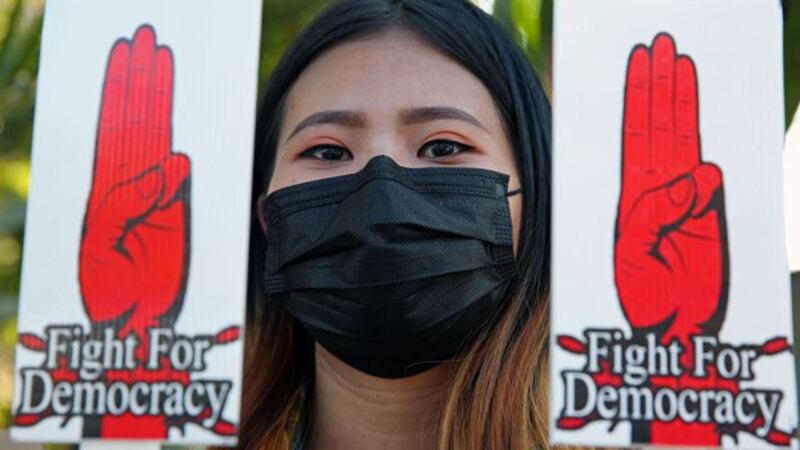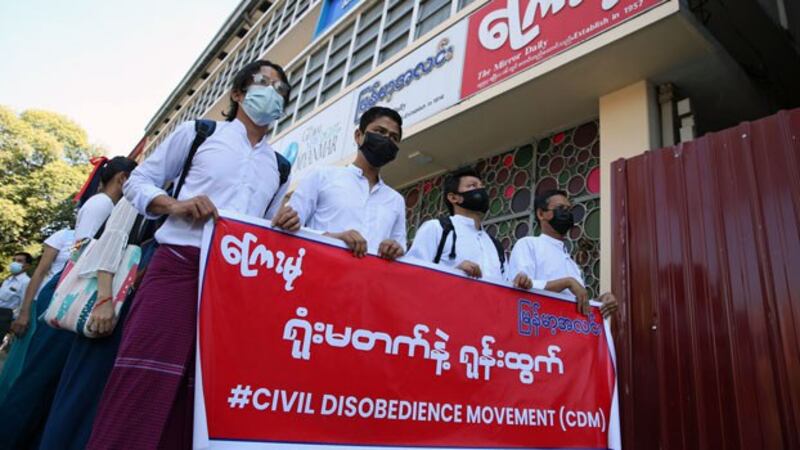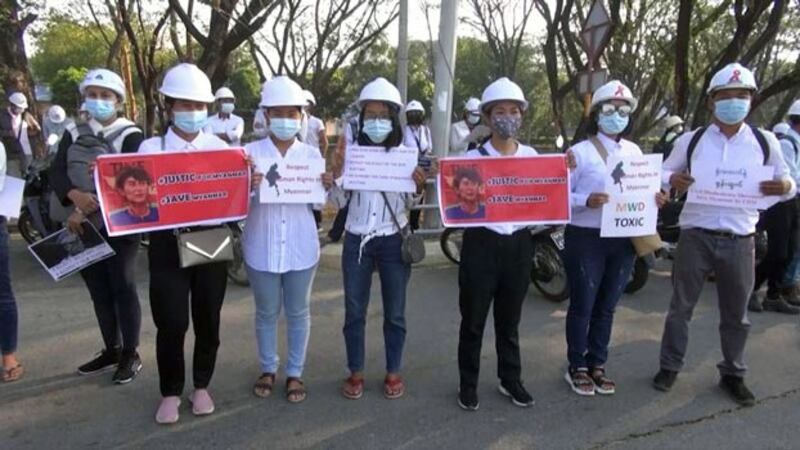Myanmar’s junta arrested 40 election officials Thursday and put pressure on others to back the army’s unsubstantiated voting fraud claims, relatives of the detained said, as mass protests around the country against the coup swelled with increasing support from white-collar government workers.
The military staged the coup on Feb. 1 after weeks of accusations of voting fraud in November elections that delivered a landslide win for Aung San Suu Kyi’s ruling party. The army started crying foul when its proxy party fell short even of its poor performance in 2015 elections.
Last month the Union Election Commission (UEC), the body that oversees voting, rejected the fraud claims in the face of pressure to investigate the vote, which was recognized by the international community as free and fair.
On Thursday, state- and local-level UEC members were systematically detained around the country, from Shan state near the border with China to coastal Ayeyarwady region.
The arrests on Thursday came as RFA obtained a copy of an order from the junta for the release of more than 20,000 prisoners ahead of Union Day on Friday, which marks an historic 1947 pact among major ethnic groups before the country's independence from Britain.
Amnesty would be granted “with the consent agreement that they would not repeat the same crime each [was] serving to 23,314 inmates who are serving in prisons and correctional facilities across the country,” it said. The order did not say which categories of prisoners would be freed.
It was not immediately clear why Senior General Min Aung Hlaing, leader of the military government, was ordering the releases at this time — whether it was a tactic to win popularity or a way of making space in the nation’s prisons to allow for more detainees should the junta conduct mass arrests of protesters.
Tin Tin Htwe, chairwoman of the election commission in Hopon township in Shan state’s Wa Self-administered zone, and her boss were taken away Wednesday night to Naypyidaw, said the woman’s sister, Thuzar Htwe. She said other election officials in the area, including her cousin, were also detained.
Authorities took Soe Tun, the 78- year-old chairman of the election subcommission in Shan state’s Kyaukme township, from his home at about 2 a.m., said a family member.
Aung Myint, the chairman of south-central Bago region’s election subcommission was arrested, said his Yangon-based son, Banyar.
“My father was taken away last night around midnight,” he told RFA.
“A young man who lives with him in Pyay informed me last night that everyone from the district and township commissions was taken away,” he said.
Military officials have asked election commission members in southwestern Ayeyarwady region to help check voter lists, said Maubin district elections commission chairman Khin Maung Win.
“The military wants our cooperation in checking voter lists,” he said.
“It’s me, the secretary, the township chairman, and the township secretary — altogether four of us. We are not being detained,” he said.

Military wants admissions
Supreme Court lawyer Kyee Myint said the pressure campaign shows that “they want to have admissions from respective UEC officials that there had been errors at various levels in the elections held by the NLD government commission.”
“It is to force the commission officials, but this is not legal,” he said. “They are seeking evidence to tell the world what they did was right, that the military takeover was right.”
Two regional assembly members in Bago region’s Padaung township and local NLD chairman Ye Lwin were arrested by police during the night, said resident Win Min Zin.
“The reason was because they had led anti-military protests yesterday,” he said.
RFA could not reach Myanmar military spokesman Major General Zaw Min Tun to confirm the arrests.
Nicholas Koumjian, head of the Independent Investigative Mechanism for Myanmar at the U.N.’s Office of the High Commissioner for Human Rights (OHCHR), said he is closely following reports regarding the use of lethal force against peaceful protesters and the detention of political leaders, members of civil society, and protesters.
“Issues related to constitutional processes, elections and democracy are not within the scope of the Myanmar Mechanism’s work,” he said in a statement issued Thursday.
“However, wherever we see indications that serious international crimes or violations of international law have been or are being committed, we will fulfill our mandate, and collect evidence and build criminal case files to hold to account those individuals responsible,” Koumjian said.
The roundups came amid leaked reports of a proposed cybersecurity law that would require online platforms and service providers operating in Myanmar to keep all user data for three years in a place designated by the government.
The State Administration Council, as the military junta calls itself, sent a copy of the proposed law to internet service providers on Tuesday, and the regime is expected to make it public on Feb. 15, said Paris-based Reporters Without Borders (RSF).
The move, designed to prevent activists from organizing more anti-coup demonstrations, has raised fears that an internet shutoff or tough internet censorship is coming.
“The provisions of this cybersecurity law pose a clear threat to the right of Myanmar’s citizens to reliable information and to the confidentiality of journalists’ and bloggers’ data,” said Daniel Bastard, the head of RSF’s Asia-Pacific desk, in a statement.
“We urge digital actors operating in Myanmar, starting with Facebook, to refuse to comply with this shocking attempt to bring them to heel,” he said. “This junta has absolutely no democratic legitimacy, and it would be highly damaging for platforms to submit to its tyrannical impositions.”
A letter is circulating on social media ordering all internet service providers, mobile operators, and international gateway providers to cut internet service on Feb. 14-28. RFA has not yet been able to confirm the letter’s validity with the communications ministry officials
In the days following the coup, the junta blocked access to Facebook, Twitter, and Instagram, though many of the country’s citizens have been using virtual private networks to circumvent the censorship. Internet service in Myanmar has been uneven for the last 10 days.

‘Incitement by unscrupulous persons’
On Thursday, the sixth day of nationwide protests that have brought hundreds of thousands of people, including government staffers, to the streets for festive and nonviolent demonstrations, Min Aung Hlaing urged civil servants to return to work and threatened legal action against those who did not.
“Due to incitement by unscrupulous persons, some civil service personnel have failed to perform their duties at present. … Those who are away from their duties are requested to return to their duties immediately for the interests of the country and people without focusing on emotions,” he said on state television.
In major cities across Myanmar, protesters marched along streets rejecting the military dictatorship and calling for the release of detained leaders and students.
Hundreds of thousands of protesters in Yangon, Myanmar’s largest city, gathered Thursday in front of City Hall at the famed 1988 pro-democracy protest focal point of Hledan junction near Yangon University, and at Myae Ni Gone junction.
Nearly 2,000 demonstrators gathered in front of Myanmar’s Central Bank Thursday morning and called on government employees to join the civil disobedience movement, though bank workers declined because of what the protesters said was the result of pressure from managers.
In Mandalay, the country’s second-largest city, Kachin, Karen, Shan ethnic groups joined government workers from local transportation, health, and education departments in protests. Military troops were seen standing guard on the city’s 73rd Street, a major north-south city thoroughfare, and near Mahamuni Buddhist Temple, a popular pilgrimage site.
Hundreds of thousands of protestors, including civil servants also rallied in Pathein, Ayeyarwady region, and in Lashio of northern Shan State.
Protests have become more widespread across Kayin state in southeastern Myanmar with marches against the military regime in nearly every township.
In Kayin’s neighboring Mon state, hundreds of thousands of people rallied in the capital Mawlamyine, observing a minute of silence in honor of Naypyidaw protester Mya Thwe Thwe Khaing, who sustained a gunshot wound to the head sustained in protests Tuesday
In Loikaw, capital of eastern Myanmar’s Kayah state, at least 30,000 people congregated to protest against the military regime. Police arrested some demonstrators as they made their way back home, sparking a rally outside the police station.
In far south Tanintharyi region, civil servants from local health and education departments joined in the civil disobedience movement.

‘At first they said it nicely’
Larger numbers of government employees joined the movement and protests at popular centers in Naypyidaw, amid pressure and threats by authorities to return to work.
A staff member from the Adjutant General’s Office taking part in the movement said senior officials threatened him and other workers via phone that action would be taken against them and that their families might also be affected. The officials demanded that workers sign pledges not to join the movement or post anything about it online.
A worker from the General Administration Department in Monywa said senior officials had threatened workers there as well.
“At first they said it nicely. We were asked to come back to work and told that the days we were absent would be marked as casual leave and that no action would be taken against us,” he said. “But afterwards when we said no, we were told that action could be taken in accordance with existing rules and regulations for government employees.”
Min Ko Naing, a Myanmar democracy activist and former 88 Generation Students Group leader, called the growing turnout for protests “very encouraging.”
“The civil disobedience movement which we are urgently calling for is gaining good momentum,” he said.
Reported by RFA’s Myanmar Service. Translated by Ye Kaung Myint Maung and Khin Maung Nyane. Written in English by Roseanne Gerin.
